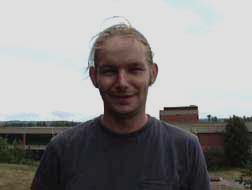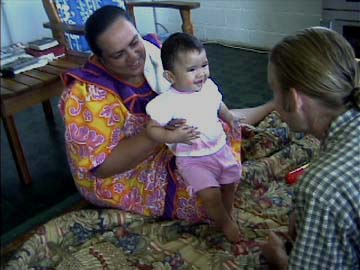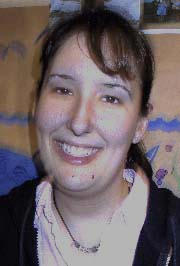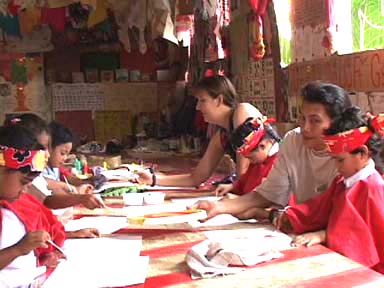Samoa
2003
I feel extremely fortunate to have been granted an opportunity to participate in the CRCHD Youth International Internship Program. Not only has this experience been beneficial to my personal and professional development, it has also helped me make important decisions regarding my future career plans.
Glenn Smith

 As
an intern, I gained invaluable insight into the complexities, obstacles
and rewards that go hand and hand with cross-cultural research. The
program was well organized from the beginning to the end, with each
phase carefully planned and directed. One notable strength of the internship
was that not only were we afforded an opportunity to learn through experience,
but we were also given a chance to learn from one another in discussions,
seminars and workshops that drew on the unique mix of skills and backgrounds
of each member.
As
an intern, I gained invaluable insight into the complexities, obstacles
and rewards that go hand and hand with cross-cultural research. The
program was well organized from the beginning to the end, with each
phase carefully planned and directed. One notable strength of the internship
was that not only were we afforded an opportunity to learn through experience,
but we were also given a chance to learn from one another in discussions,
seminars and workshops that drew on the unique mix of skills and backgrounds
of each member.
My placement in Samoa allowed me to learn a great deal about another culture (and working within another culture) while learning new skills and enhancing others. I learned a lot about networking and intercultural communication, about adapting to various contexts, as well as about myself. I feel that I have grown a great deal in the past 8 months and that this experience has in many ways prepared me to continue on with my education at a post-graduate level. I plan on returning to school to pursue a Masters degree in anthropology in the near future.
The
support provided by Dr. Callaghan and Ms. Didkowsky was phenomenal throughout
the internship and the feedback supplied while in-country was outstanding.
The open-ended nature of the project also allowed for sufficient flexibility
in dealing with the many obstacles which myself and the other interns
encountered. I am truly grateful to have been granted such an amazing
opportunity and hope that others may benefit from future experiences such
as this one.
Samoa
2002
During my six months in Samoa I have had the opportunity to develop new skills and enhance those that I already had. When I arrived here, I had the expectation that the child development tasks I had studied at home would run similar to how I had practiced. When this did not happen, I had to quickly think of adjustments I could make to the tasks that would still allow for the proper data to be recorded. These were minor adjustments such as using different toys, finding proper locations to run tasks, and making sure the people working with me understood the tasks. All of a sudden I was in the leadership position and I had people depending on me to make the right decisions in order to get the job done.
The cross-cultural differences were much greater than I had imagined especially the language barrier. I had a difficult struggle to learn the language but with the help of a tutor and persistent individual study I was able to learn enough to understand what people were saying. This was invaluable when running the tasks because I could tell when my helpers were not phrasing questions to the children properly. It would not have been possible to learn the language so quickly if I had not been dedicated to my study and well organized.
Chandra Clowater


Other aspects of the project have also taught me the value of good organization. I had 19 different tasks to focus on, questionnaires, ethnographies and interviews. Although I did not accomplish all of the tasks I feel that those that I have accomplished I did well because I realized I needed to be organized early on. Not only did I have to prepare for the day ahead in advance but also I had to structure my weeks in order keep motivated with the research. The minute I found a new contact or organization I had to act on it so as not to waste any time. I set up meetings, did presentations and talked to mothers, teachers and women's organizations trying to find new possibilities for doing research. I was very successful in talking to teachers and organizing days at preschools where I could run the tasks.
I have developed better communication skills because I had to explain my project to many different groups and individuals who were interested in why I was in Samoa and what I was doing. I talked to preschool principals and received great letters of recommendation from them because I presented my research and myself well. I have also received praise from the National University for my presentation on the research to the education department. This has made me more confident in my ability to communicate effectively with others.
One of the most important skills I have developed throughout my stay in Samoa is the ability to network and take advantage of opportunities when they arise. It was key for me to get involved in Samoan culture by going to special events being hosted at the National University such as the Samoan Studies conference. I made friends with women my age who are mothers and found they were most helpful in explaining the mother’s role to me. I also asked for referrals at some of the preschools and recommendations to other schools in the area and I kept my eyes open when staying in new places for families that could help me. I believe that networking worked well for me because I presented myself with a friendly smile and always took the time to get to know people before starting my work. I also think that a large part of this was saying thank you and letting the people know how much their help meant to me.
